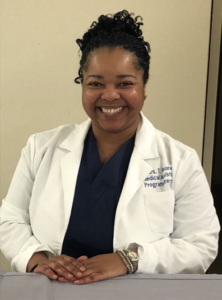Congratulations to This Year’s Rising Star! – Toya Moore
 Toya Moore, M.Ed., AHI, CHT, RMA, CCMA
Toya Moore, M.Ed., AHI, CHT, RMA, CCMA
Director of Allied Health and CMA programs
Seattle Colleges
“Toya has done incredible work in her role as the Medical Assisting Program Director at Seattle Central College. She successfully transferred the program from Seattle Vocational Institute (SVI) when it closed down to the Health Education Center (HEC). She put incredible effort to revise the curriculum, expanded her TAC board to be inclusive of multiple stakeholders and the community, and went through years of data during the reaccreditation process. Not only has she handled all the administrative aspects of the program, but she has also developed course content, taught MA courses, further developed the partnership between Seattle Central and Kaiser Permanente to provide students a full-ride scholarship, and led the charge to develop a MA apprenticeship program. Additionally, she worked to lower the cost barriers for students through revising the program to be completed only four quarters and eliminating the fee for students to take their certification exam. Her hard work has lifted the MA program to higher caliber for her students, the college, and the community.” – Francisco Ramos, Spec., Outreach, Seattle Central College
Who inspired and mentored you along the way and how did they shape the person you are today?
Toya Moore: I have been blessed with awesome teachers throughout my life. From kindergarten to high school and into my higher education pursuits. I cannot give credit to just one, but Dr. Joe Fagan was my mentor for 15-years. He was the grant writer and the head of the Psychology Department for Case Western Reserve University. It was an awesome experience and it made me want to be the best that I could be for people.
What were the lessons you have learned from your education and experience and how have they helped you in your work and life?
Toya Moore: Big lesson that I have learned is to really step outside of myself and receive what is in front of me at the moment. What I mean by that is as planners, as educators, we tend to think of how things are supposed to go. The lesson I have learned is that you can have a vision, but that vision may not be the one that is right for the moment and the people that you are servicing. Another big lesson I have learned is to really listen. Throughout my education process, throughout being an instructor, and throughout being a director, listening has such a key factor in my plan according to needs. This ranges from the needs of your students to instructors, along with the needs of the college. Listening actively has really been one of the biggest lessons and skills that I have developed over the years. Because it is not about me, it is about how I can help the need that I am hearing from others.
The Medical Assisting profession chose me in 1994. My field experience includes CRRT (continuous renal replacement therapy) – ECMO (extracorporeal membrane oxygenation) at Cleveland Clinic Intensive Care, Pediatric and Adult Trauma Unit at University Hospital Emergency Department, hemodialysis out-patient, Nephrology Intensive Care, Gerontology, Oncology, Labor & Delivery, Member Service Representative, Hospital Patient Advocate, Wound Clinic, HIV/AIDS Clinic, Surgery Unit.
I earned my Associate from Cuyahoga Community College, where I participated in Bridges to Success in the Sciences. The Bridges program exists to assist minority students in obtaining a degree in the sciences. It was in the Bridges program that I was introduced to the research that supports EBP (evidence-based practice). I earned my bachelor’s in psychology from Cleveland State University. I continued to work in hospitals while earning my degree. I also worked in a Psychology research lab at Case Western Reserve University for 15 years under the mentorship of Dr. Joseph Fagan. I earned a master’s degree in Adult Education from Cleveland State University
The combination of patient care and knowledge of EBP inspired me to deliver in the classroom. I became a Certified Allied Health Instructor for Medical Assisting. I wanted students to be prepared to assist the medical team and the patients they serve. The classroom led me to become a Program Director for Medical Assisting. My desire to direct correlates with my desire for students to be prepared. I am passionate about the career of Medical Assisting. For students to be prepared, they are required to be enrolled in a program that is not only compliant but engaging and inspirational as well.
It is my responsibility to my students and faculty to remain current. I am an engaged Director to ensure that our program provides students and faculty with the curriculum, policies, practices, and equipment required to graduate great MAs to serve our communities. As a life-long learner myself, I give my students and program the same energy I give a patient depending on my skill, compassion, empathy, and knowledge. I love what I do.

